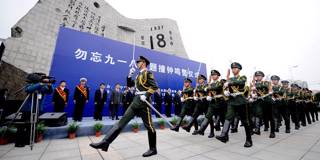For China, the Manchurian crisis of 1931 – and the subsequent 14-year Japanese occupation – remains a touchstone for national remembrance. And yet it seems to inspire little reflection, let alone influence China's approach to today’s geopolitical challenges.
OXFORD – Ninety years ago, on September 18, 1931, a junior Japanese military officer detonated an explosive that had been carefully laid by a Japanese-owned railroad near the northeastern Chinese city of Shenyang (then known in the West as Mukden). The blast did little damage, but that wasn’t the point. The Japanese blamed Chinese soldiers for the explosion, which they used as a pretext to capture Shenyang and occupy the entire territory, known as Manchuria.
Though Manchuria was a Chinese territory, controlled by warlords loyal (in name if not in reality) to China’s nationalist government, thousands of Japanese soldiers were stationed there under the terms of an earlier treaty. This enabled Japanese forces to overrun the area quickly. Within weeks of the Manchurian Incident, they controlled the southern part of Manchuria, with the north following by early 1932.
This was no imperial invasion, the Japanese claimed. Rather, it was a response to the cries for help coming from the people of Manchuria, who were suffering under the warlords’ iron-fisted rule. Japan merely wanted to help oppressed people to establish an independent state that would liberate them from the maelstrom of corruption that enveloped the rest of China.

OXFORD – Ninety years ago, on September 18, 1931, a junior Japanese military officer detonated an explosive that had been carefully laid by a Japanese-owned railroad near the northeastern Chinese city of Shenyang (then known in the West as Mukden). The blast did little damage, but that wasn’t the point. The Japanese blamed Chinese soldiers for the explosion, which they used as a pretext to capture Shenyang and occupy the entire territory, known as Manchuria.
Though Manchuria was a Chinese territory, controlled by warlords loyal (in name if not in reality) to China’s nationalist government, thousands of Japanese soldiers were stationed there under the terms of an earlier treaty. This enabled Japanese forces to overrun the area quickly. Within weeks of the Manchurian Incident, they controlled the southern part of Manchuria, with the north following by early 1932.
This was no imperial invasion, the Japanese claimed. Rather, it was a response to the cries for help coming from the people of Manchuria, who were suffering under the warlords’ iron-fisted rule. Japan merely wanted to help oppressed people to establish an independent state that would liberate them from the maelstrom of corruption that enveloped the rest of China.